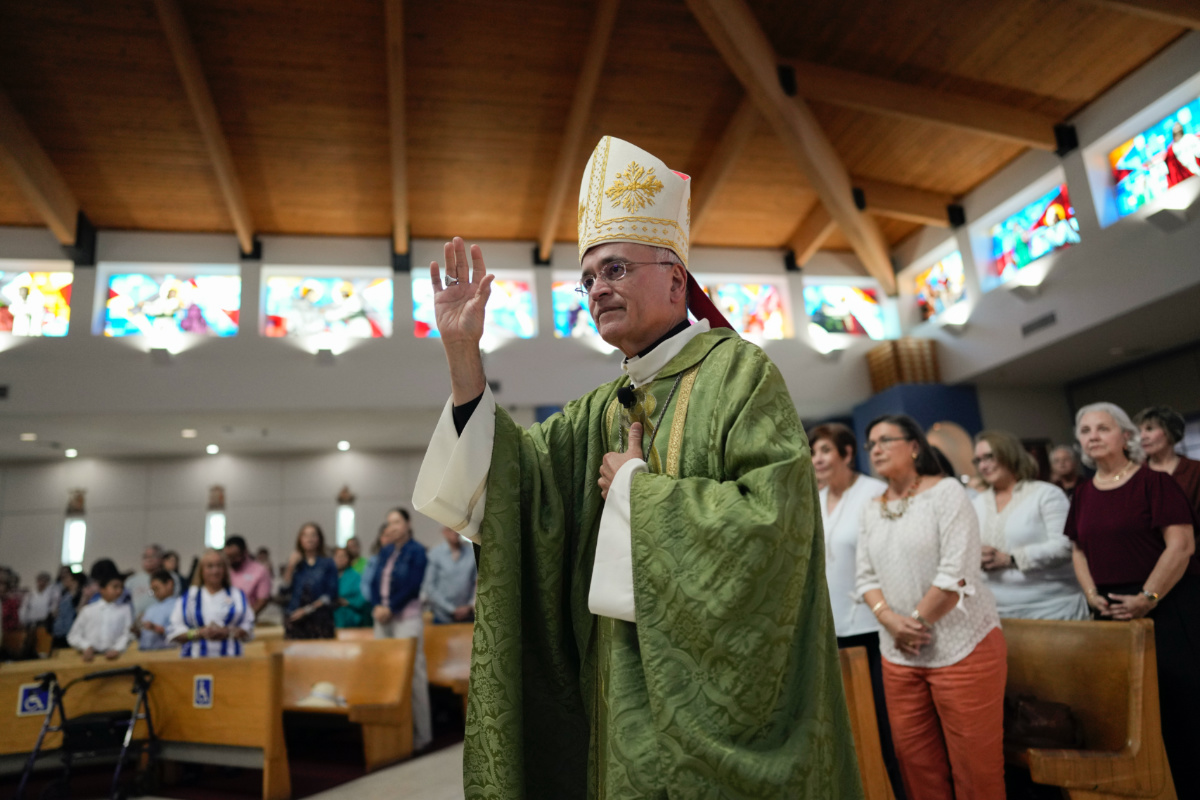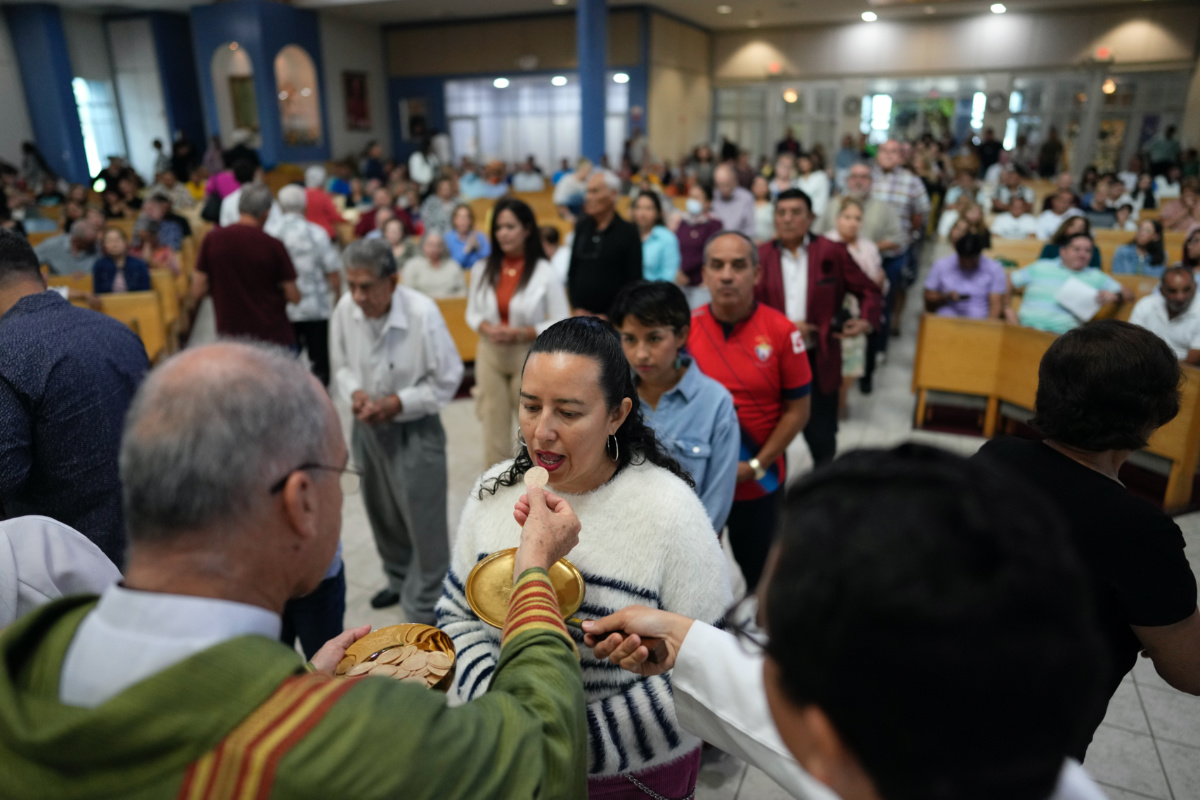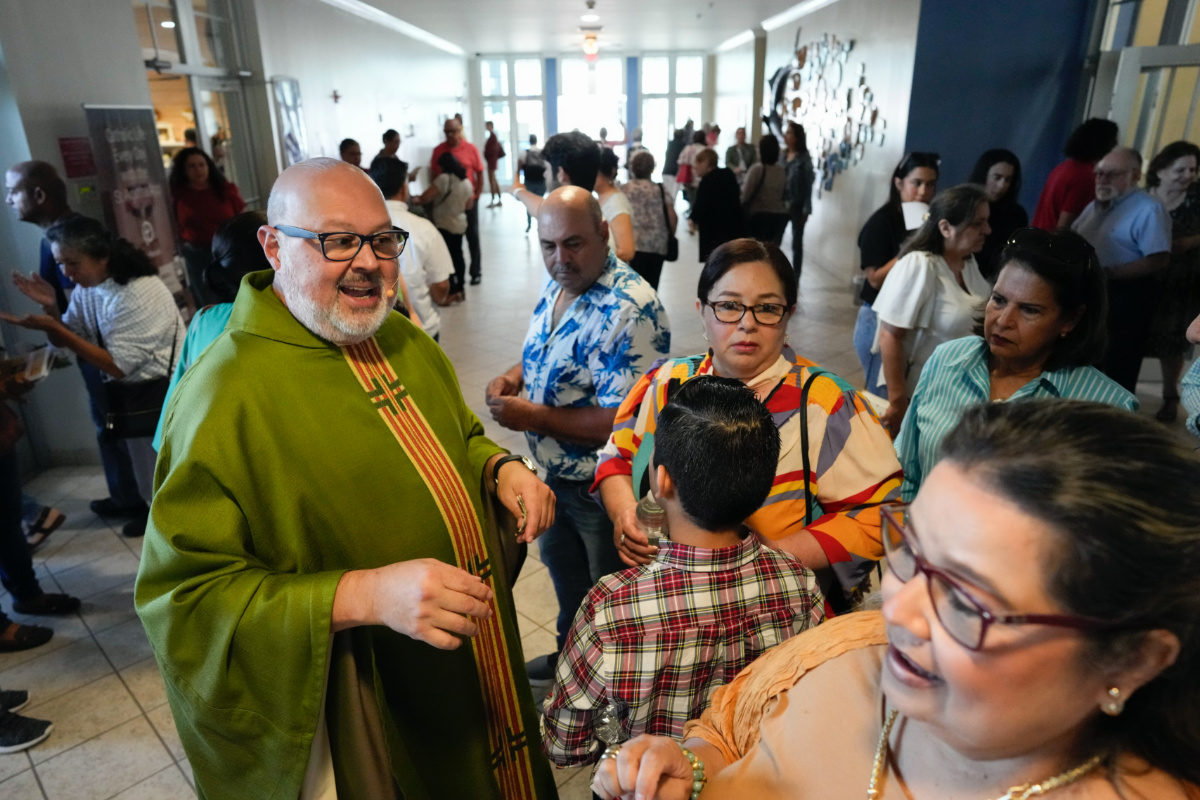
GIOVANNA DELL’ORTO, of Associated Press, reports from Miami…
Miami, Florida
AP
When Rev Silvio Báez finished his homily on a recent Sunday, applause broke out among the hundreds of faithful in St Agatha Catholic Church, on the outskirts of Miami, that has become the spiritual home of the growing Nicaraguan diaspora.
For the Auxiliary Bishop of Managua, his fellow priests and many worshippers who have fled or been exiled from Nicaragua recently, the Sunday afternoon Mass is not only a way to find solace in community. It’s also a means of pushing back against the government’s violent suppression of critics, including many Catholic leaders.
“For me, it’s the moment when I am closest to the people of Nicaragua. It’s like going back for an hour,” Báez told The Associated Press after greeting a long line of congregants outside the sacristy. “My constant message is, ‘Let’s not lose hope, let’s not get used to a situation that God doesn’t want.’”

Rev Silvio Baez, Auxiliary Bishop of Managua, Nicaragua, waves to parishioners as he enters to perform Mass at St Agatha Catholic Church, which has become the spiritual home of the growing Nicaraguan diaspora, on Sunday, 5th November, 2023, in Miami. PICTURE: AP Photo/Rebecca Blackwell.
Báez said he left Nicaragua in the spring of 2019 only because Pope Francis told him to, “to save my life – he said he didn’t want another Central American martyr bishop.”
But the Pope has added, “don’t abandon your people,” Báez said, and these Miami Masses, which are also livestreamed, have become his way to preach resilience.
“My constant message is, ‘Let’s not lose hope, let’s not get used to a situation that God doesn’t want.’”
– Rev Silvio Báez
His recent homilies, based on Jesus’ teachings about love of God and neighbor as well as the importance of acting out one’s values, have denounced “dictators who say they love God but oppress the people.” He has decried the hypocrisy of those who call themselves “the people’s president” only to “nullify these very people, denying them fundamental liberties.”
“From Monday to Saturday we live through vicissitudes, problems, all sorts of things, and on Sunday with the homily it’s like a glass of water in the desert,” said Donald Alvarenga as he arrived for Báez’s service.
Alvarenga rarely attended Mass in Nicaragua but doesn’t miss one here since he was among more than 200 Nicaraguans released from detention, forcibly expelled to the United States in February and later stripped of citizenship by the government of President Daniel Ortega.
Ortega has had an uneven relationship with faith leaders for decades. His government, like some other Latin American governments, traces its roots back to a socialist revolution that was opposed by Catholic hierarchy, though supported by some liberal clergy.

Rev Edwing Roman gives communion to parishioners during Mass at St Agatha Catholic Church, which has become the spiritual home of the growing Nicaraguan diaspora, on Sunday, 5th November, 2023, in Miami. PICTURE: AP Photo/Rebecca Blackwell.
Since repressing popular protests in 2018 that called for his resignation, Ortega’s government has systematically silenced opposing voices and zeroed in on the church, including confiscating the prestigious Jesuit-run University of Central America in August.
Nicaragua’s congress, dominated by Ortega’s Sandinista National Liberation Front, has ordered the closure of more than 3,000 non-governmental organisations, including Mother Teresa’s charity.
“This is the last independent institution, the Catholic Church, that Ortega doesn’t have complete control over. It’s really trying to overtake the last institution that could be a threat to his legitimacy,” said Michael Hendricks, a politics professor at Illinois State University and former Peace Corps volunteer in Nicaragua.
Repression even extended to barring many patron saint’s feasts and Easter processions in a country where the Christian faith has vast cultural resonance, Hendricks added. An estimated 10 per cent of the population has fled – more than half a million since 2018.
The moves against young protesters and the church, where college student Cinthya Benavides was active in youth ministry, pushed her to leave Nicaragua – fleeing her house with only her passport, phone and laptop as police knocked on the front door.
“I had to come illegally. But my faith sustained me,” she said at St Agatha, where she and two fellow members of the Nicaraguan University Alliance distributed flyers about church persecution.
Her own parish priest was in prison for a while. Last month, Nicaragua released a dozen Catholic priests jailed on a variety of charges and sent them to Rome following an agreement with the Vatican.
But Bishop Rolando Álvarez has remained in prison for more than a year and received a 26-year sentence after refusing to get on the February flight to the United States.
Báez opens each Mass with a prayer for Álvarez’s health, strength and “unconditional freedom.”
Rev Edwing Román, who also celebrates Mass at St Agatha, said Álvarez’s detention in a notoriously harsh prison convinced him returning to Nicaragua isn’t an option for now.
Román had come to the United States in 2021 for a short trip to baptize a relative. But while here, he was made aware of threats he would be jailed if he returned to his parish church in Masaya, where he had assisted injured protesters.
“It was a humanitarian ministry. I have no regrets,” Román said. One evening during the 2018 protests, he heard cries and shots outside his rectory and, after opening the door in his pajamas, ended up spending hours washing off blood and teargas from injured youth.

Rev Marcos Somarriba talks with parishioners following Mass at St Agatha Catholic Church, which has become the spiritual home of the growing Nicaraguan diaspora, on Sunday, 5th November, 2023, in Miami. PICTURE: AP Photo/Rebecca Blackwell.
With donations of gauze and other supplies, he started a small dispensary in his parish, where the bodies of dead protesters were also taken. That earned him accusations from authorities of being a “terrorist” intent on overthrowing the government, and police routinely detained him when he left the church, he said.
To former political prisoner Carlos Valle, who was exiled in February, the courageous ministry of priests like Román and Báez serves as a “spiritual guide.”
“We feel refuge with them, they’re exiled just like us,” said Valle. Of his 12 children, 11 have also fled Nicaragua – one stayed behind because she works for the government.
We rely on our readers to fund Sight's work - become a financial supporter today!
For more information, head to our Subscriber's page.
Every week, newly arrived Nicaraguans knock on the parish door, needing help with everything from legal immigration assistance to a place to stay – an increasingly tough ask as hundreds of thousands of exiles and migrants have strained Miami’s welcome.
“To help them, for me is an obligation,” said St Agatha’s pastor, Rev Marcos Somarriba, who himself came decades ago as a teen. “I know what it’s like to go through this.”
Báez said the church, in addition to offering practical help, can continue advocating for human rights and for a different social and political way because “there, nobody can say this.”
Many priests, nuns and other exiles worry about reprisal, especially against their families still in Nicaragua, and fear going public with their stories. But others feel a responsibility to bring awareness and a sense of hope.
“Even fear we have already lost,” said Nestor Palma as he distributed flyers about exiled priests and political prisoners at St Agatha. “That’s why we’re in this daily struggle, so that the light might not be lost.”






